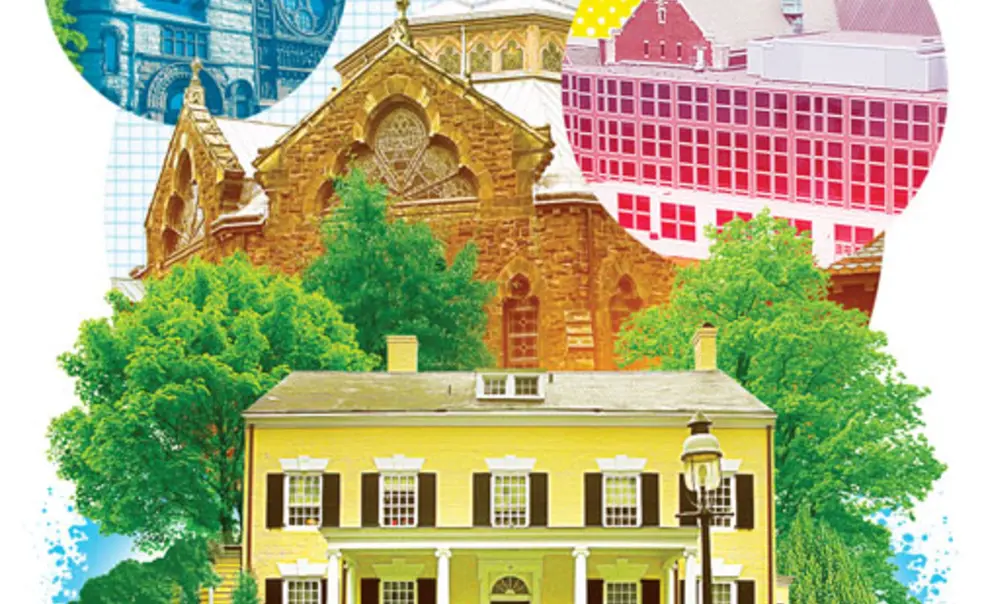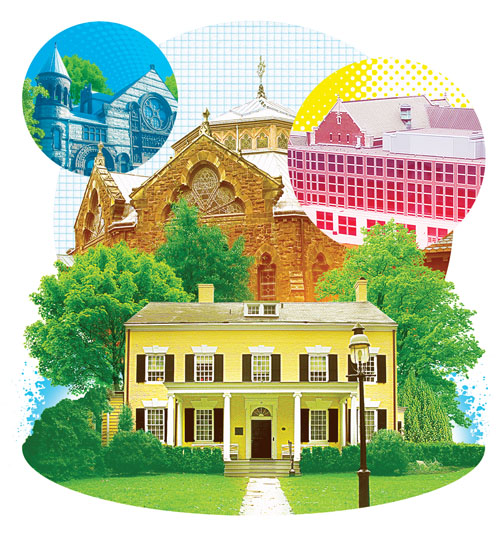Challenge Over Taxes
Buildings’ use, royalty payments lead to lawsuit over tax-exempt status
A lawsuit challenging tax exemptions for about 20 campus buildings has widened into an effort to overturn the University’s tax-exempt status. New Jersey Tax Court Judge Vito Bianco declined Princeton’s request to dismiss parts of the case in June and said the issues should go to trial.
The suit, brought by a small group of Princeton residents in 2011, initially took issue with the tax-exempt status of Prospect House, McCarter Theatre, Richardson Auditorium, Dillon Gym, Frist Campus Center, and several other University buildings, arguing that they housed commercial activities that were not central to the University’s educational mission. Maclean House, home of the Alumni Association, was cited for providing services — including Princeton Journeys — “to persons who are not students.” The University responded that the buildings are used for school purposes and that their operations are not conducted for a profit.
The plaintiffs then challenged Princeton’s nonprofit status as a whole, saying that patent royalties paid to the University and shared with faculty are a form of profit-sharing and conflict with state requirements for nonprofits.
“I don’t believe there is any chance in the world that the court will decide that Princeton University has ceased to be an educational institution that qualifies for tax exemption,” said Robert Durkee ’69, the University’s vice president and secretary. He said that if the suit brings any changes, they would affect specific buildings, and “the effect would be very modest.” No trial date was set as of mid-August.
The lawsuit cited University Research Board figures reporting that Princeton shared $118 million in patent royalties with faculty from 2005 through 2011, including $34.8 million in 2011. According to University policy, Princeton pays an inventor 50 percent of the first $100,000 of net income from royalties; 40 percent of the next $400,000; and 30 percent of the amount above $500,000.
“No one suggests that Princeton’s scientists and engineers should not share in the gains the University makes from their intellectual property, but the University cannot have it both ways under New Jersey’s exemption laws — it cannot claim exemption as a nonprofit organization that does not distribute profit, while intentionally commercializing for profit its intellectual property under a pre-existing policy of profit sharing with its faculty/partners,” the lawsuit said.
Durkee said that the Bayh-Dole Act of 1980, which allows universities and other nonprofits to retain the patent for an invention whose development was supported by federal research funds, requires that royalties be shared with the inventor. In addition, he said a greater public interest is at stake.
“We do have an interest in a system that can convert the ideas of our faculty into useful services,” Durkee said. “It’s not just a matter of knowledge for knowledge’s sake; it’s knowledge that can be applied to areas like health and national security.” This leads research universities such as Princeton to be “eager to find partners” who can turn ideas into commercial ventures, he said.
Princeton’s most celebrated example is the anti-cancer drug Alimta, developed by chemistry professor emeritus Edward Taylor in conjunction with Eli Lilly & Co. The drug, first marketed in February 2004, has generated hundreds of millions of dollars in royalties and supported construction of the Frick Chemistry Lab.
The University is the largest taxpayer in Princeton; last year it paid $7.7 million in local taxes, and about a third was for properties — primarily graduate-student housing — that could be exempt under state law, Durkee said.
Municipal and University officials are about to begin negotiations on the future of the University’s voluntary contribution to the town. The University is paying $2.48 million this year. Durkee said both sides would benefit from a multi-year agreement, but he said the legal challenge “does cast a shadow” on the talks.
If the suit is successful, it would decrease taxes for Princeton residents, said lawyer Bruce Afran, who brought the legal case.
The lawsuit is one of several against the University that involve the estate of Eleanor J. Lewis, a Princeton resident and a lawyer who was executive director of the N.J. Public Interest Research Group and a state insurance official.
Lewis, who died in 2010, set up a trust fund that Kenneth Fields, secretary-treasurer of the fund, described as “a type of [Ralph] Nader [’55] organization for Central Jersey” that would fund public-interest litigation. Other lawsuits have challenged the zoning approval for the arts-and-transit project and the Dinky station’s relocation.
Princeton’s annual income from licensing patents and technologies increased from about $2 million in 2003 to about $127 million in 2012.
Source: Office of the Dean for Research













No responses yet